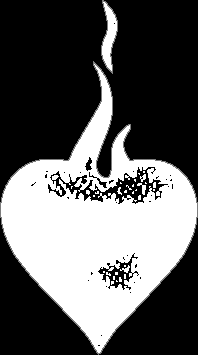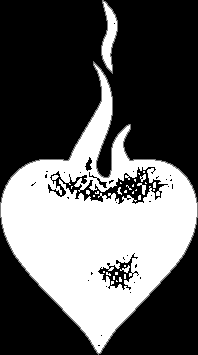Straight from the Hart (5 page)
Read Straight from the Hart Online
Authors: Bruce Hart

A week after he’d pulled the plug, on May 7, my mother gave birth to her twelfth child — my brother Owen. Ordinarily, when a new baby arrives, it’s a joyous occasion, but this time around, because of all dire financial straits, it seemed to make the hard times even more pronounced.
When I look back now on that period, I kind of shudder; it reminds me of that grim, John Steinbeck novel
The Grapes of Wrath
— everything bleaker than bleak. During that stretch we barely had food to put on the table and my dad —
who, in days gone by, used to pull up to the local Safeway store and load up the car with groceries — now had to swallow his pride and ask the store manager if he had any black bananas, stale bread or whatever else they might give him.
Most of our clothing at the time came from the Salvation Army, which was anything but fashionable. I can recall many a time, cruel, insensitive kids at school made fun of us for our attire. My brothers and I became kind of immune to the putdowns or would, on occasion, challenge our oppressors to fights after school, but it was pretty hard on my poor sisters — who were often reduced to tears because of the insulting and derisive taunts.
When I think back now on that tough time, I find it hard to fathom why people discriminate against the poor or underprivileged. Poverty, obviously, isn’t a lifestyle anyone chooses.
StraightFromTheHart.indb 22
10/8/10 5:08:51 PM


That November, with things looking increasingly bleak, my dad happened to run into Ron Chase, the new programming director of CHCT television in Calgary, which was the station my dad had been on back in the ’50s. In talking, Chase mentioned that he used to be a big fan of the wrestling show and inquired as to whether my dad might be interested in coming back to his station. My dad, of course, jumped at the opportunity and they soon had agreed on bringing the show back, for the start of January 1966.
I can still recall the big smile on my dad’s face when he came home that day and informed my mom that he was getting back into the wrestling business.
Helen had never been a huge fan — even during the boom time — and had come to see the wrestling business as more of a curse than cause to celebrate.
She, however, seemed to realize that this was perhaps our last chance to salvage things and threw herself into the mix with as much enthusiasm and energy as she could muster.
There was only one problem though — Stu Hart didn’t have two cents to rub together and the start-up costs would include refurbishing the rings, advertising and other costs, not to mention getting talent. My dad, who’d loaned thousands of dollars to friends and associates around town when business had been good,
23
StraightFromTheHart.indb 23
10/8/10 5:08:52 PM
♥
BRUCE HART
♥
began calling around, hoping someone could oblige him, but all his supposed friends turned him down and, as the January start date loomed closer, it was beginning to look like the whole endeavor might not get off the ground —
which had my mom pretty distressed.
A few weeks before Christmas, with the thermometer hovering around forty below, my dad arrived in his broken-down old Cadillac to pick us up at school and happened to run into our principal, Harold Sharlow, who, oddly enough, had at one time sold tickets for my dad, back in the ’50s. As they got to chatting, my dad related how he had a chance to start up the promotion again but was strapped for cash and the whole thing appeared to be in jeopardy. Sharlow immediately offered to lend him a few thousand dollars and that would prove to save our bacon, as my dad put it.
With the money in place, my dad then embarked on trying to line up talent
— which, given how tough it had been the year before, seemed a daunting task.
This time around though, he had considerably better luck. One of the things that worked in our favor was the prevailing racial tension in the United States
— the protest marches, Martin Luther King, Mississippi burnings, the KKK
and all of that — which made it tough for black wrestlers, especially heels, to find work.
As a result, my dad was able to secure the services of some terrific African American talent, including a colorful, outspoken black heel named Sweet Daddy Siki, who, I’m told, was the main inspiration for another black athlete making a name for himself at the time — Cassius Clay, who would later change his name to Muhammad Ali. Siki — who had bleached blond hair long before Dennis Rodman ever dreamed of it and who did cutting-edge promos —
referred to himself as “Mr. Irresistible” and claimed that he was “the women’s pet and the men’s regret.” He would prove to be an instant box office smash for our promotion. He also recommended a young black babyface he’d been tutoring — Rocky Johnson — who would similarly become a mainstay of the promotion. Years later, I would work with Rocky in Hawaii, where I made the acquaintance of his son Dwayne, who went on to star in the WWF as the Rock and has subsequently become an ever bigger star in the movies.
StraightFromTheHart.indb 24
10/8/10 5:08:52 PM
♥
STRAIGHT FROM THE HART
♥
Not to digress, but one of the things I don’t think my dad was ever really given much credit for were his efforts in breaking down the color barrier in wrestling.
Back then, very few of the mainstream promoters in the States — several of whom I heard were thinly veiled racists — would use black wrestlers. Even if they did, all too often they tended to place them in demeaning, stereotypical, Amos and Andy type roles. My dad, however, for want of a better term, tended to be “color blind.” If a guy was a decent performer and capable of drawing, his color, race or creed was never an impediment to getting pushed in Calgary.
When my dad had opened the promotion in 1948, one of his top babyfaces was Woody Strode — then a star with the Calgary Stampeders. Strode, along with Kenny Washington, had been the first black players in the NFL in 1945, two years before Jackie Robinson’s celebrated entrance into major league baseball.
Over the years, my dad was responsible for launching the careers of countless awesome black workers, including Siki, Johnson, Luther Lindsey, Abdullah the Butcher, Junkyard Dog, George Wells, Sailor Art Thomas, “Bad News” Allen and Lethal Larry Cameron — all of whom would become major attractions in the United States, Japan and elsewhere.
If you do a little further research, you’ll also find that my dad was one of the first promoters in North America to employ Japanese wrestlers. I’m not sure why they weren’t welcomed in the United States — perhaps due to some lingering animosity after the Second World War, but for some reason, back in the day, very few promoters in the States seemed to want anything to do with them. My dad, however, saw the potential in using them and, over the years, helped launch a myriad of great Japanese stars, including the likes of Kinji Shibuya, Mitsu Arakawa, Mr. Hito, Kim Sakurada, Chatti Yokouchi, Junji Hirata, George Takano, Hiroshi Hase and Jushin Liger.
He also would break in several of the biggest Samoan stars, including Neff Maiava, Afa and Sika Anoia, Reno Tuufuli, Siva Afi and Alo Leilani — none of whom seemed to be able to find work before he gave them their proverbial break.
As far as the launch of the promotion goes, in addition to Siki and Johnson, my dad was able to secure the services of a few other decent hands for the January start, among them: Alexander the Great (Al Ward), Stan Stasiak, Gil
25
StraightFromTheHart.indb 25
10/8/10 5:08:52 PM
♥
BRUCE HART
♥
Hayes, Leo Burke, his brother Yvon (the Beast), Newton Tattrie, Joe Peruzovic (later Nikolai Volkoff) and Johnny Kostas — all of whom were instrumental in helping to get the new promotion off the ground.
Necessity, as they say, is the mother of invention and that proved to be the case for us that January. Because money was so tight, my dad decided that rather than shooting a studio TV show, which was the norm back then, he’d shoot his show live at the house show in the Stampede Pavilion instead. Most other promoters of the day figured he was out of his mind, giving fans something they were accustomed to paying for for free. His peers predicted he’d be out of business in no time. That didn’t prove to be the case; the show became one of the highest-rated shows in Western Canada. Nearly thirty years later, when Vince McMahon opted to do the same with
Monday Night RAW
, people in the United States hailed him as an innovative visionary — and conveniently forgot my dad had come up with the concept decades before.
As the commentator for the new show, my dad turned to a guy named Ed Whalen, who was the news director of the TV station but had done ring announcing for my dad in his native Saskatoon several years before, while he was attending university. Whalen, as anyone who ever caught our show can attest, proved to be an excellent fit; in fact, for my money, he was the best wrestling commentator ever — better, even, than Jim Ross, Gordon Solie and Lance Russell, which is saying a lot, because all of those guys were incredible.
Aside from impeccable timing, a succinct sense of humor and this innate ability to know when to let the action speak for itself, what made Whalen really exceptional was that unlike most other wrestling commentators he wasn’t on the promotion’s payroll and therefore refused to shill or put over anything that didn’t warrant it. That proved to be of great benefit to the promotion because, if something stunk or was lousy, he refused to put it over, and since my dad backed him, implicitly, it forced the wrestlers to shape up, or they’d be shipped out.
By the same token, if something was done exceptionally well, Whalen could put it over like nobody else. He had a collection of signature sayings, like “malfunction at the junction” when referring to a mistake or screwup, and
“ring-a-ding-dong-dandy” when referring to an exceptionally good match. His
26
StraightFromTheHart.indb 26
10/8/10 5:08:52 PM
♥
STRAIGHT FROM THE HART
♥
sayings would become part of the vernacular in Western Canada, and helped make the show an enormous hit.
Although our promotion, which was still in the trial and error process, didn’t break box office records or set the wrestling world on its proverbial cauliflowered ear that winter, it did well enough to break even, occasionally even turning a modest profit. This enabled my dad to stave off the creditors and financially get back on his feet.
StraightFromTheHart.indb 27
10/8/10 5:08:52 PM


